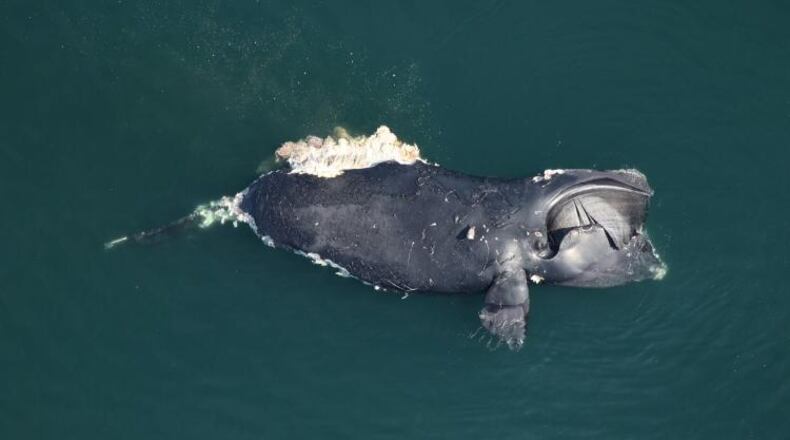Yet another critically endangered North Atlantic right whale has been found dead off the coast of Virginia, the National Oceanic and Atmosphere Administration (NOAA) said Tuesday.
Right whales are among the rarest large whale species, with an estimated 350 left in the world. The animals migrate up and down the Atlantic coast of the U.S. and can often be found off the coast of Georgia during their winter calving season.
The animal that died was an adult female identified by the agency as a number: 1950. She was first spotted in 1989 and gave birth to at least six calves, the most recent born this winter.
The calf was not seen in the vicinity of the mother’s carcass, which was scavenged by sharks and found floating about 50 miles east of Back Bay National Wildlife Refuge in Virginia. Conservationists warned the calf’s chances of survival were slim given its young age.
The dead whale has been towed ashore where scientists will study it to determine a cause of death.
The death of #1950 marks the 40th mortality in what authorities have deemed an “unusual mortality event” impacting North Atlantic right whales since 2017, NOAA said. Boat strikes and entanglements in fishing gear are the biggest threats to right whales, but climate change is also thought to play a role in their decline.
The federal government is currently weighing whether to expand speed limits in the whales’ calving zone to include boats measuring 35 feet and above. Currently, the rule only applies to vessels 65 feet and longer.
Conservationists say forcing boats to slow down is vital to try to prevent right whales’ extinction. The change has been opposed by the maritime and shipping industries, as well as some Georgia lawmakers, including U.S. Rep. Buddy Carter, a Republican who represents both the Savannah and Brunswick ports. Opponents cite concerns over safety and economic impacts.
The carcass off the coast of Virginia is merely the latest in a string of fatalities over the last several months. In March, a calf that had been hit by a boat washed ashore on Georgia’s Cumberland Island, just weeks after another young whale was found dead near Tybee Island. In January, another right whale was found dead off Martha’s Vineyard, Massachusetts.
Kathleen Collins of the International Fund for Animal Welfare issued a statement Tuesday warning that 2024 was poised to be one of the deadliest years for right whales.
“As this species races towards extinction, our government continues to be distracted by partisan politics,” Collins said. “Science-based regulations are the only solution to prevent the human-caused demise of the right whale.”
NOAA has asked the public to report any sightings of right whales while maintaining a 1,500-foot distance. The Greater Atlantic Marine Mammal Stranding Hotline is (866) 755-6622 and the Southeast Marine Mammal Stranding Hotline is (877) WHALE-HELP ((877) 942-5343).
A note of disclosure:
This coverage is supported by a partnership with Green South Foundation and Journalism Funding Partners. You can learn more and support our climate reporting by donating at ajc.com/donate/climate/
About the Author
Keep Reading
The Latest
Featured




